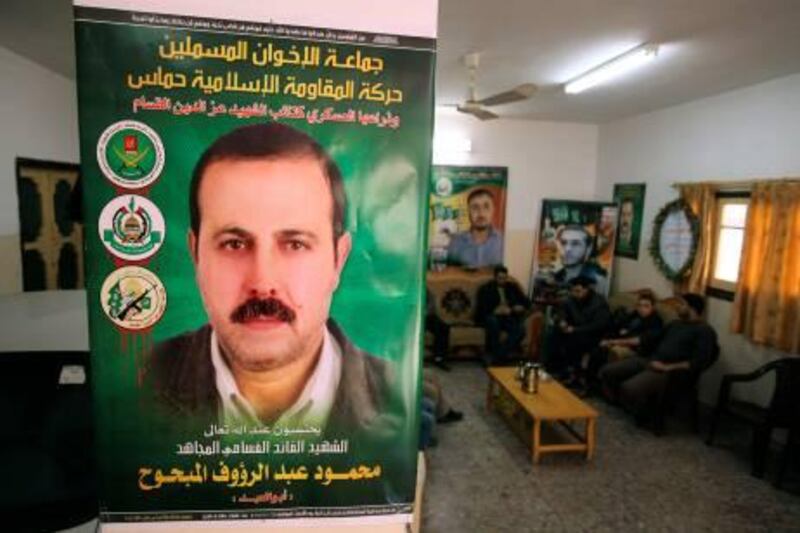TEL AVIV // Eight months after allegations that Mossad was involved in the assassination of a top Hamas official in Dubai triggered diplomatic tensions between Israel and its allies, the Israeli spy agency is again mired in controversy.
Mossad attracted media attention in recent days after a report on Friday in The Wall Street Journal about suspicions that a British national who had used the identity of a dead Israeli soldier was involved in the plot to kill the Hamas commander.
The report drew anger from the Israeli family of the soldier and again appears to raise questions about whether Mossad - widely believed to be behind the slaying - might have overestimated its capabilities to carry out such operations without leaving a trace. Relatives of the former soldier expressed fury after the report, which said that a 62-year-old Briton linked to the murder had formerly used the name of Yehuda Lustig, whom official Israeli obituaries say was killed during the 1973 Arab-Israeli war.
"We would like to meet face to face with whoever decided to use the identity of our dead son without consulting us," said a statement from the family. In reference to Mossad's alleged ties to the murder, they added: "With all due respect to national security, this was a thoughtless and stupid act." Dubai's police chief, Lt Gen Dahi Khalfan Tamim, has repeatedly accused Mossad of orchestrating the killing of Mahmoud al Mabhouh, a founder of Hamas's military wing, on January 19. Israel has neither confirmed nor denied the accusations.
The findings in the Journal's report were greeted with silence by Israeli officials. Nevertheless, they were a reminder of the uproar caused months earlier by the Dubai police's discovery that more than 20 alleged members of the team that killed the Hamas operative used fake British, Irish, French, German and Australian passports to enter and leave the city. Several residents of Israel holding dual nationalities and whose names matched some of the alleged hit-squad members have said their identities appear to have been stolen.
The episode drew global criticism, prompting the expulsion of several Israeli diplomats by Britain, Ireland and Australia. The repercussions from the apparent passport abuse appear to be continuing. Yesterday, the Israeli news website NRG reported that Ireland's defence ministry had cancelled an annual contract to buy bullets from Israel. Gen Tamim said this week that a key suspect in the killing has been arrested abroad but details were secret. That came more than four months after an alleged Israeli spy known by the name Uri Brodsky was arrested in Warsaw on a warrant issued by Germany in connection with the killing.
Poland had agreed to extradite him, but he was set free on bail by a German judge, flew to Israel and has since been out of the public eye. Condemnation of Mossad's alleged actions has been stronger abroad than in Israel, where media organisations face heavy state censorship on any issues deemed as potentially harmful to national security. Nevertheless, domestic disapproval of Mossad has recently become apparent.
A Haaretz newspaper report in August cited Michael Bar-Zohar, a Mossad expert, as suggesting that the organisation's over-confidence at times leads to blunders. "The feeling is that we are the best in the world, and therefore a sense of Israeli amateurishness sometimes creeps into the system," he said. "This means they send people who are not as seasoned as they should be and they trust that they will not be caught and identified."
The controversy over the Dubai assassination has raised speculation that Meir Dagan, who has headed Mossad for the past eight years, may soon be replaced. Yisrael Hayom, a newspaper viewed as close to the Israeli prime minister, Benjamin Netanyahu, reported last month that Mr Netanyahu may sack Mr Dagan. The paper said Mr Dagan's "formerly sterling reputation" has been stained by the assassination.
Under his leadership, the report added, Mossad was blamed for the "lack of accurate intelligence" about the Gaza-bound aid ship aboard which Israeli commandos killed nine Turkish activists during a raid in May. Mossad is believed to have been behind the 1988 high-profile assassination in Tunis of Khalil al Wazir, known as Abu Jihad, a top deputy of Yasser Arafat, the then-Palestinian leader. Al Wazir was viewed as a key planner of Palestinian military attacks against Israel.
In 1974, Mossad agents mistakenly killed a waiter carrying a Moroccan passport in the Norwegian town of Lillehammer, confusing him with Ali Ahmad Salameh, a Palestinian whom Israel believed to have masterminded the 1972 massacre of Israeli athletes at the Munich Olympics. In September 1997, two Mossad agents carrying fake Canadian passports botched the planned poisoning of the Hamas leader Khaled Meshaal in Jordan. The blunder led to the resignation of the Mossad director and to Israel's apologising to Jordan and handing over the antidote to the poison.






